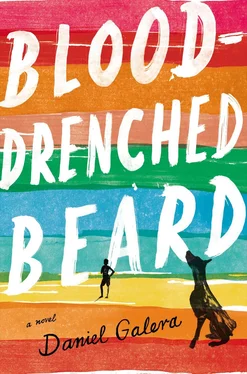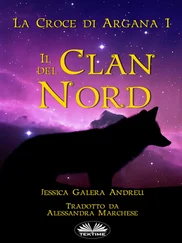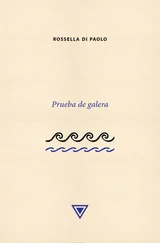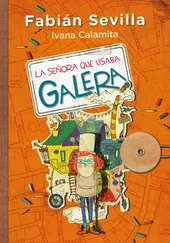That morning he crosses the next hill and comes out on Luz Beach and then the sandbar at the entrance to Ibiraquera Lagoon. There a strong, icy wind blows in, and he starts to tremble violently with cold. He eats the rest of the food in his backpack, and instead of continuing along the beach, he takes the dirt road and walks to the first junction. Cars go past from time to time but don’t stop. Finally the driver of a white pickup sees him signaling for a lift and pulls over. He greets the man through the crack in the window.
Morning.
Afternoon.
Where are you headed?
To Tubarão. I’m going to get on the interstate.
Hmm.
Where do you want to go?
Garopaba.
I can leave you in Araçatuba.
That’ll work. Thanks.
The dog’ll have to ride in the back.
I’ll ride with her. She might jump out.
The chubby blond man looks straight ahead, with one hand on the gear stick and the other on the steering wheel with a lit cigarette. His skin is a little reddish, and he is unshaven. He is wearing a gray knitted sweater, a scarf, and a beret. The stench of tar wafts through the window. The windshield wipers squeak against the glass three times.
Ah, what the hell, get in.
He leans across to unlock the passenger door.
With the dog?
He nods and waves them in.
He puts his backpack in the middle seat and settles the dog at his feet.
I’m going to get your car all wet.
Don’t worry, it’ll dry as soon as the sun comes out.
The pickup rattles on the road dug out by the rain. The driver blows his smoke through a crack in the window and clears his throat from time to time.
Where’re you coming from?
Garopaba, actually.
You work here in Ibiraquera?
No, just hiking around a bit.
In the rain?
I left home thinking it was going to stop in two or three days, but I’m not so sure it was a good idea.
The flood in Blumenau’s looking pretty ugly. A friend of mine works at the Port of Itajaí and said the water hasn’t stopped rising.
Really? Flooding?
Haven’t you seen it on TV? It’s all they’ve been talking about. They’re collecting donations for the flood victims now, and the thieving’s already started. Not to mention that now they’ve got an excuse to put off the expansion of the highway for another few years. Every month of delay is worth another ten-bedroom mansion on a hill. In a nature reserve, of course. Contractors, suppliers — everyone’s swimming in federal money. It was supposed to be ready in 2008. In the original plan they forgot to include Laguna Bridge, the Morro dos Cavalos Tunnel, a whole bunch of things. Now they’re saying it’ll be ready in 2010. I’ll tell you when it’ll be ready. Never. Literally never. When a section of highway is ready, another section that was ready two years earlier will need to be rebuilt. The tarmac they’re using is like eggshells. The pilfering’s never-ending.
Do you use the highway a lot?
All the time. I’m an engineer. I’ve got two houses under construction here, and I came to take a look at them because of all the rain. My clients wanted them ready by December, but I told them not to hold their breath.
The headlights of an old truck appear halfway around a bend, and the pickup skids and almost slides into a ditch at the side of the road. The engineer curses.
Fucking bastard.
Look what I found when I was walking over the headlands.
He opens the side pocket of his backpack and takes out the two arrow tips.
What’re those?
Arrow tips.
The driver flicks his cigarette butt through the crack in the window and takes his eyes off the highway for a second to glance at the two triangular stones that he is holding up in his palm.
Are you sure?
Yep — look at the chipped edges. The stone is smooth. It was polished.
The driver turns his head again but this time looks not at the stone but at him, giving him a quick once-over. The conversation dies. As he gets out, he apologizes for having got the seat of his car all wet and offers him one of the arrow tips as a present. The driver thanks him and puts it in his glove compartment.
He tries to hitch another lift at the side of the road near the turnoff to Araçatuba, but no one stops. He is starting to feel hungry, so he goes into a diner and orders two meat pasties and a Coke. The girl at the cash register turns her head to the back of the establishment, looking for someone who isn’t there, then looks at him.
Have you got money?
Of course I have.
He realizes he is dripping onto the floor and goes to eat in the small covered area outside. He gives half of his second pasty to the dog, pays, and starts walking along the edge of the road toward Garopaba, sticking out his thumb to pickups, trucks, and old cars, but no one pulls over, and he soon stops looking over his shoulder every time he hears the drone of an engine. Near speed bumps and pedestrian crossings, drivers slow down and glance curiously at the bearded man and dog walking in the rain. Chances are he knows some of the people heading for Garopaba, but he’d never be able to recognize anyone through the fogged-up windows of a moving vehicle. Just in case, though, he meets every gaze with a smile and a wave. A woman smiles back but doesn’t stop and another gives him a piercing look of indifference. One man is about to pull his van over but decides against it midmaneuver and steps on the accelerator. One or two miles later he spots Branca Rock on his left and decides to leave the highway and continue along the dirt road to Encantada.
He is surprised by the abruptness of nightfall and takes shelter in a garage under construction next to an empty house not far off the road. He can see car headlights passing in the distance, but all he can hear is the water dripping from the roof and the desperate croaking of toads in the flooded land behind the house. Beta insists on gnawing on one of her back paws, clicking her teeth, and panting. He lies down in his sleeping bag, but for the first time in days he doesn’t feel sleepy. He rolls onto his back, puts his hands behind his head, and tries to make out the wooden beams of the roof in the darkness. The cold air has a pleasant smell of wet cement that reminds him of the garage he liked to spend time in as a child. His favorite songs start appearing one after another in his head, and he is surprised to discover that they are still intact in his memory. He sings quietly and little by little raises his voice until he is belting it out in the choruses. They are songs that his mother and father used to listen to when he was young. He sees his mother as a young woman singing the sad verses of “Mucuripe,”* as she trims the pink azaleas and white germanders in the garden of their old house in Ipanema on a Sunday afternoon with the record playing at a high volume in the living room. His father preferred tango and gaucho music, and as a result he is able to hum the melody of a few Gardel hits and sing a number of popular folk songs from beginning to end. He sings “Veterano,” the eighties classic,* in counterpoint to the screeching of the toads and crickets. The louder he sings, the warmer his body gets. He has never again heard songs as beautiful as the ones his parents used to listen to. Whatever became of those records? They were divided up when his parents divorced. His father kept his, of that he is sure. No one remembered the records. It upsets him to think that they may have been sold for peanuts or given to Dante. His brother was obsessed with old blues songs in his adolescence and for many years listened to nothing but blues and underground or indie bands that hadn’t yet found mainstream success. English singers whining that all it does is rain on their heads. And Viviane was the only person he had ever met who liked classical music so much that she frequently went to hear the Porto Alegre Symphony Orchestra and dragged him along to recitals. She knew more about the pieces and composers than the programs did. To him, it was an ambiguous experience. Sometimes he’d leave the concert hall feeling that he’d been swept away, but he didn’t care if he never heard anything like it again. For some reason his ear was unable to retain the music. He didn’t have a single word to describe his impressions, couldn’t tell the difference between Bach and Mozart, and had only a vague notion that there was that famous piece by Beethoven. And yet one piece in particular has never left him. Just one, the one Viviane said was her favorite and which she referred to as “my Chopin nocturne.” That piece is me , she used to say. He hums it softly now, most definitely off key, but the melody resonates in all its lunar placidity, with precise piano notes, in the chamber of his imagination.
Читать дальше












